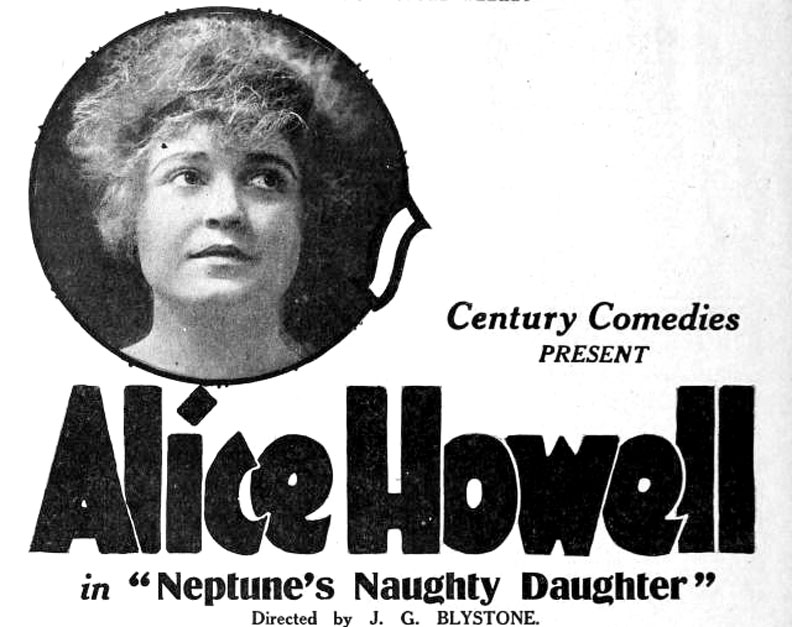Mabel Normand had a head start. I’ll give you that. Her association with Mack Sennett and with Roscoe Arbuckle has put her name in the consciousness of those with only a passing awareness of silent film. The Jerry Herman musical “Mack and Mabel” didn’t hurt either. Alice Howell, on the other hand, has pretty much only come to light in the last few years.
It could be argued that Alice Howell and Mabel Normand made a nearly equal number of starring comedy shorts. If you go through their filmographies on IMDb and remove the shorts Mabel made where she is in a supporting (or smaller) role in films she was in before 1913 or 1914, the tallies start to line up. Even more so when you discount the films where she co-stars with Roscoe Arbuckle, worth considering since in many of them Roscoe’s character is the one driving the story and who has the most comedy business.
Aside from her final year of films, made at the Roach studios, Mabel starred in comedy shorts from 1912 to 1916. Alice from 1916 to 1925, with a brief break in the early 1920s.
The Century Comedies brand was initially created for the production and distribution of Howell’s comedies. Century expanded beyond the Howell shorts and existed into the 1920s, releasing through Universal its comedy shorts starring Baby Peggy, Wanda Wiley and others.

Alice Howell is not credited with direction or writing on any of her films, but certainly had a hand in these creative aspects of them. She mentions this in an interview in the trades. Ask any clown or physical comedian working today, and they’ll tell you that regardless of who is the director, there is input all around taken in, especially from the lead performer if it’s a project or piece of business they’re the lead performer in.
What I find surprisingly contemporary, to some degree, with Alice’s comedies is that her character is usually that of a young, unattached woman trying to make her way in the world. She leaves home on her own, or lives in a rooming house by herself (with her dog), and does her best to hold down a variety of jobs. One could draw a parallel between the Alice Howell comedies and Mary Tyler Moore’s Mary Richards character on her eponymous sit-com of the 1970s.
There are a number of Howell’s surviving films — Neptune’s Naughty Daughter (1917) comes to mind — where she finds herself in one of those silent film situations where she is trapped by a man who clearly has designs on her. In Neptune, she subdues one “hands-ey” guy in a restaurant in a clever way. Cornered on a ship below deck she literally fights back, kicking Fatty Voss in the stomach, shoving him out the door into the ocean, and fires a harpoon gun at him.
I’m not saying one of these comediennes is better or more important than the other. I’m saying we should be talking about Alice Howell more, maybe as much as we do of Mabel Normand. And, in both cases, more of their films deserve to be available. Mabel’s films are around, certainly, but in dupey copies run too fast, at 24 fps, in older DVD releases on budget labels. Alice’s films are, to a great extent, missing.
Here’s hoping more Alice Howell comedies turn up, and that Mabel Normand gets her due with a quality multi-disc release of her films.
The Alice Howell Collection 2-disc DVD set was released during Women’s History Month last year, in March 2019. It’s available on most online retailers like Amazon, the TCM Shop, DeepDiscount et al. Buying links are on the Undercrank Productions site’s page for the DVD.
